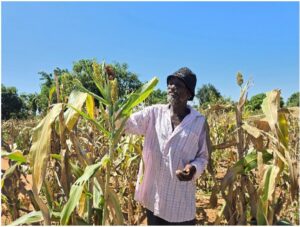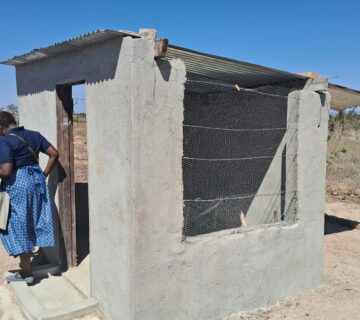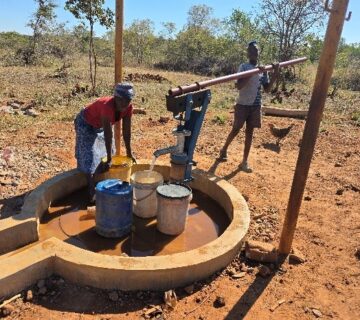…cheers to lessons learnt…
Mr. Cephas Mukutirwa, a 56-year-old farmer, stood in his fields reflecting on his journey in agriculture before and after Tsungai. As a breadwinner to a big family, he always had a dream to secure a good harvest to cater for food security for his family.
 Once a staunch believer in traditional farming methods, he had always favored the plough, shunning the basin holes. However, the struggle of recent years has forced him to reconsider. “Harvest were plentiful in the past, but now, I was no longer reaping what I sowed,” Cephas recalled with a hint of sadness.
Once a staunch believer in traditional farming methods, he had always favored the plough, shunning the basin holes. However, the struggle of recent years has forced him to reconsider. “Harvest were plentiful in the past, but now, I was no longer reaping what I sowed,” Cephas recalled with a hint of sadness.
Cephas with the various seeds of 2.5kg groundnuts, 1 kg pearl millet, 1kg sorghum and 2 kg cowpeas he received motivated him to invest in this program for the November to March/April 2025 farming season. For the first time in his farming history, he did his basin
holes(makomba) and tried other new techniques as they
were taught by the Tsungai Project.
Tsungai is an Emergency and Resilience-Building project focuses on enhancing the resilience and food security of vulnerable households through integrated interventions in the agriculture and WASH (Water, Sanitation, and Hygiene) sectors. The project aims to enable households to achieve food security by providing training on agricultural practices, including soil fertility management, moisture conservation, and planting techniques.
 Due to the inadequate rain after he planted his various crops, some crops did not germinate well, determined, Cephas reploughed his fields, and this time, the seeds flourished. “I saw the advantage of using makomba, my seed survived because the basins retain so much
Due to the inadequate rain after he planted his various crops, some crops did not germinate well, determined, Cephas reploughed his fields, and this time, the seeds flourished. “I saw the advantage of using makomba, my seed survived because the basins retain so much
moisture” he said, a newfound appreciation lighting up his
face. Thanks to the knowledge he gained from the
Tsungai Project, he realized the significant value of these
methods. This year, his harvest was much better, yielding. a good harvest of pearl millet, ground nuts, and sorghum.
 With a household of thirteen, Cephas felt the pressure of providing for his family. “We often had just one meal a day mainly just Sadza in the evening. It was a relief when the children went to school, knowing they wouldn’t be worrying about food throughout the day,” he shared. “I am happy that this harvest will surely take me a long way.”
With a household of thirteen, Cephas felt the pressure of providing for his family. “We often had just one meal a day mainly just Sadza in the evening. It was a relief when the children went to school, knowing they wouldn’t be worrying about food throughout the day,” he shared. “I am happy that this harvest will surely take me a long way.”
“With the lessons learned and the promise of better harvests, he envisions a brighter future for his family, one where food scarcity would no longer haunt their days, and where seed availability gives them comfort for the next season.



No comment